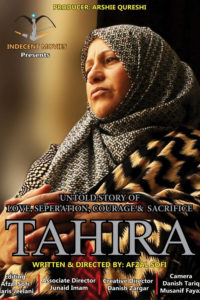
IVWFF 2020 Documentary Short Film Review “Tahira”
NO TRAILER CURRENTLY AVAILABLE
First, the Recap:
Fleeting existence. We see all around us as something that is ultimately temporal, guided by the unseen yet evident hands of time, which only tends endear us to those facets of our lives that mean the most, that we desire to hang onto and cherish with all we are. However, when one such facet, say, a beloved husband, leaves home one day for business a distance away but never makes it to his destination, vanishing without any trace, the reality of absence becomes palpable and heavy. As the despairing wife, Tahira Bano, along with family, searched for her suddenly missing husband whom was never found, it stirs within her a fire to become a voice for others who have similarly had fathers, sons, brothers, and husbands disappear. The place is Srinagar, Kashmir. The time is during the troubles with India. The story is one of sadness, the need for closure, a cry for justice, and one woman whose courage and fortitude continues to inspire the ongoing searches for those who have mysteriously evanesced.
Next, my Mind:
While there is within standard narrative film the often necessary means to escape from what we know and immerse ourselves in flights of fancy, it remains equally veritable to establish that, sometimes, there isn’t anything more overtly impactful to bring a message across than real life. Such it is with this abbreviated yet fully resonating 13-minute documentary short film from director/editor Afzal Sofi and producer Arshie Qureshi along with associate director Junaid Imam, assistant director/editor Haris Jeelani Toogo, and creative director Danish Zargar, screened in association with the 2020 I View World Film Festival sponsored by the embassies of India, Canada, Sweden, Netherlands, Italy, Argentina, British Council, and The EU, curated by Engendered Delhi, and in partnership with NYCSAFF.
The story of Tahira Bano is one that encompasses a life that began as well as any other, even in the leaner times that eventually were overcome and better times initiated. Having married at twenty-two and having two sons, life then took a decidedly tragic and enigmatic turn in 2002 when her husband left their home in Kashmir for business in Delhi but never did reach his destination, literally disappearing never to be found despite best efforts by Tahira and her family. It promoted a severe alteration in Tahira’s path, even as she recalls the start of hostilities between Kashmir and India that would cause the death of thousands and the vanishing of thousands more, also never found.
Battling the specter of depression for well over 15 years, Tahira still managed to raise her two sons, whom she resides with, while becoming deeply involved with human rights organizations such as Jammu Kashmir Coalition of Civil Society (JKCCS) and the Association of Parents of Disappeared Persons (APDP), in order to ensure through her own pain and need for reaction and acknowledgement that others who’d endured their own disappeared loved ones could remain unified in their common, agonizingly frustrated but steadfast cause, staging monthly meetings and protests, even as the government ignored and even banned their gatherings. Yet, undaunted, Tahira continues to maintain the fight for answers and keep the issue of enforced disappearances on the human rights radar.
What then gives this journey additional focus and both heartbreaking and inspiring momentum is Tahira’s personal depth of commitment in it all to also ensure her two sons were able to be schooled properly, able to support their own lives, while staying true to their devotion and support of a mother who’s been through a time some people would have crumbled under. Instead, the film ultimately showcases the genuine heart of motherhood even in the harsh circumstances experienced, and it only lends more credence to the degree of perseverance Tahira has demonstrated to not just her own family, but to so many others who are likewise suffering the pain of loss due to the enforced disappearances.
Additionally, Tahira’s drive and determination even brought her to a place where she worked for and now owns a salon in Srinagar that became the provision for her and her sons, even as her own in-laws denied her any share of property after her husband vanished and her own father was unable to assist. Having the single room home and sending her kids to an orphanage to ensure they were going to attend school and get the necessary education, she still maintains that they continue to study while she works tirelessly. The culmination of this leads to a beautifully stirring final moment in the film which sums up the unconditional love and tears of a woman who’s encountered the unthinkable and yet has risen above the hurt to be a voice for change and challenge to those who still refuse to do anything about the plights of so many.
Therefore, in total, “Tahira” is one of those cinematic efforts that I am so grateful to filmmakers for being willing to invest in and make, sharing with the world at large a very needed reminder that even in the worst of situations, there is good that is being done, that there are those who are willing to stand firm for human rights and the due justice that is required even if not yet attained, and that the selfless side of human nature does still exist. Let’s hope it will be the catalyst for transformation this planet and its people so desperately need to rediscover and live out.
As always, this is all for your consideration and comment. Until next time, thank you for reading!



